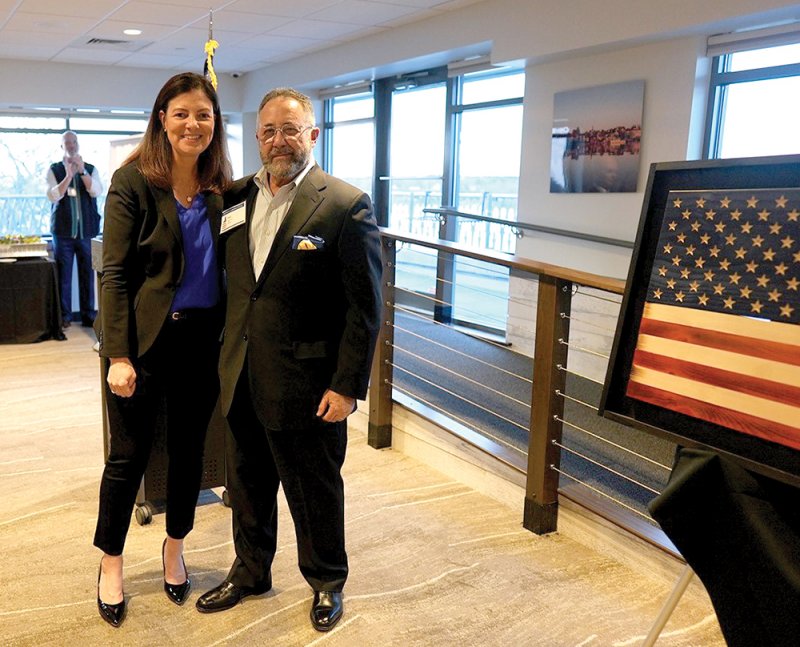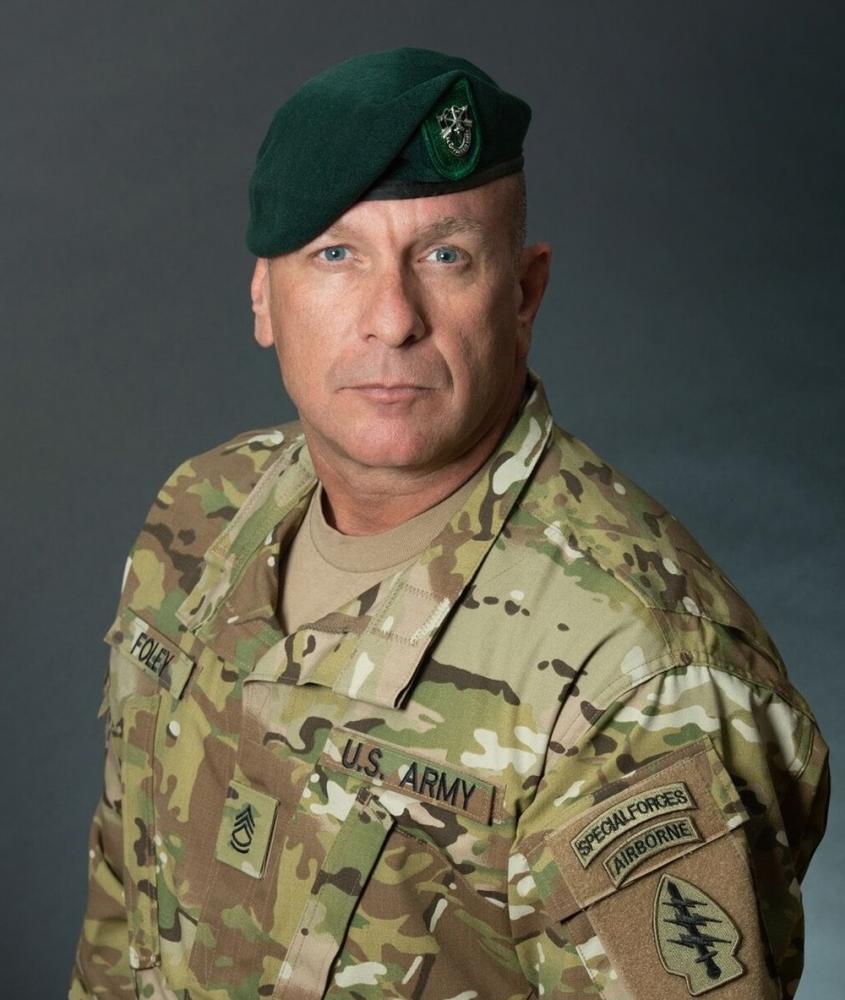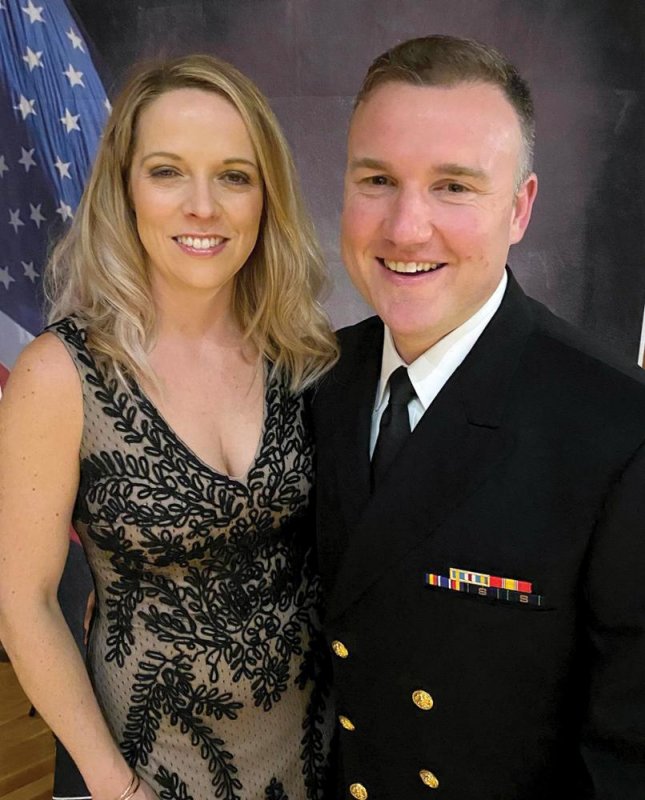 Paul Forte, co-founder of the Military Coaching Alliance, with Kelly Ayotte. (Courtesy photo)
Paul Forte, co-founder of the Military Coaching Alliance, with Kelly Ayotte. (Courtesy photo)
Even as employers fight for talent, some of the most disciplined, diligent and conscientious workers in the state may be struggling to find a job. Veterans are used to following orders, showing up on time and seeing things through to the end; all qualities an employer would hope to find but the type of experience and accolades veterans come with doesn’t translate easily in civilian world.
A group of business leaders and former military officers, including CEO Paul Forte of FedPoint, came together in 2018 to create the NH Military Coaching Alliance, a mentoring program that aims to make that transition easier.
FedPoint in Portsmouth provides benefits services, including enrollment and premium administration, to more than a million active and retired members of the armed forces and their eligible family members and plays host to the alliance. “We know that transitioning from active duty to the civilian sector isn’t easy, and we want to do more than simply say ‘Thank you for your service.’ The alliance helps veterans cross over the divide to new and enriching life experiences, which often include, but are not limited to, satisfying jobs,” Forte says. “Of course, these veterans bring to employers the leadership skills, technical knowledge, and personal discipline needed in the workplace, making the arrangement beneficial to both parties.”
Forming the Alliance
Col. Hunt Kerrigan, the military outreach advisor at FedPoint and a co-founder of the Alliance, says when he retired in 2015, after 32 years in the Army, his transition was difficult. But because his service had brought him into contact with the business world, he realized he was better off than many. While attending a Veterans Count gala, he was looking around the room and realized that if the professionals assembled there were willing to give a little of their time that could make a big difference for his fellow veterans. It dawned on him had he asked if anyone in the room would like to serve as a mentor, “everybody would have put their hands up,” says Kerrigan. “There’s such a great sense of patriotism and wanting to help the military in New Hampshire. Why not see if there are business leaders out there who would be interested in serving as mentors?”
Kerrigan says mentoring is important in the military, noting in the Navy, a sailor new to a ship is assigned a mentor called a Sea Daddy. This led to the nickname for the Alliance, “Operation Sea Daddy.”
Among those whom joined Forte in forming the Alliance are: Phil Taub of Nixon Peabody, radio and media personality Jack Heath; retired executive Greg Whalen; Jeff Hiatt of Performance Business Solutions and Jim Spotts, Kerrigan’s self-described second-in-command, or XO, for the Alliance.
A Ripe Workforce
Spotts, who retired from the Coast Guard in 2016, says NH has about 130,000 veterans, roughly 10% of the population. While NH is a veteran-friendly state, he says when he met Kerrigan at a veteran event, they both realized more needed to be done to help veterans make the difficult transition to civilian life.
Spotts says veterans will often go through a series of jobs until they land where they best fit. “We try to pair them with a business leader who can help them and help mitigate that path of going through the multiple jobs,” he says. “It takes patience, but they are not used to not working and the idea of taking it slow until you find the right fit is foreign to them. Teaching them the value of networking and how to network is as important as anything else we do.”
 One of the first veterans to be mentored was Will Foley (pictured), a U.S. Army Special Forces Green Beret and combat veteran. He retired from the military in 2014 and earned a bachelor’s degree in organizational leadership at Southern NH University.
One of the first veterans to be mentored was Will Foley (pictured), a U.S. Army Special Forces Green Beret and combat veteran. He retired from the military in 2014 and earned a bachelor’s degree in organizational leadership at Southern NH University.
“For a lot of us senior guys, NCOs and officers, the initial instinct is to want an executive position with great pay and benefits,” says Foley. “Unless you are a general that’s not going to happen. So, you come to grips with reality and realize you have to start from scratch, not just in a career and in industry but just getting your foot in the door.” His first placement was at AutoFair and he now serves as an education and outreach account manager to the Army and Air Force for FedPoint.
Mentoring and Making Connections
Foley says making connections is critical to landing the right job. “Networking is one of the most important things, [making] authentic relationships well beyond connecting on LinkedIn. It’s great to keep in touch but it is not enough,” says Foley.
“Alliance networking events are hosted at homes or restaurants and are a great opportunity for motivated veterans to meet some great people.” He notes that there are no other settings that specifically enable veterans to talk one-on-one with executives and CEOs. “They are building a solid network of true relationships.”
Gray Chynoweth, former CEO of Minim and now an investor and a naval reserve intelligence officer, says after becoming a mentor he realized as a business leader that there was a huge untapped labor pool among people coming out of the military.

Naval reserve intelligence officer, and former CEO of Minim, Gray Chynoweth, and his wife, Tara. (Courtesy photo)
“They have really strong experience, but it does not use the language of the private sector,” he says. “That’s one of the big challenges, to describe their military experience in a way that is private sector relevant. It could be that there’s skills [that] are applicable in sales or customer service or project management but it’s almost always the case that whatever job they had it never said sales or project management or had titles that would be easily understood outside the military.”
Chynoweth says it is important to have a strategy to help veterans determine what they want to do. “It’s tough if you come out and you get two or three jobs and leave after three to six months. That can be very bad for your resume. We coach people into a kind of known experiment where they can do a fellowship or short-time work or contract work where they can get a variety of different experiences, so they know where they want to go and what they want to do,” he says.
Spotts says a veteran might not have exactly the right skill set that’s required by the job description, but they have a no-fail mentality. “They’ll get in there and figure it out. They show up on time, they work hard and will push through the challenges,” he says.
Companies are looking for people who are dependable, have integrity, are quick on their feet and can make decisions, says Brigadier General Paul N. Loiselle, who serves as commander and assistant adjutant general of the Puerto Rico Air National Guard. (He met Forte while stationed at Pease Air National Guard base just across from the headquarters of FedPoint.)
“With the unemployment rate the way it is and millions of jobs going unfilled, it’s critical that we use the military and their skill sets,” he says, adding when he finishes his time in Puerto Rico, it’s a strong possibility that he will return to NH to become even more involved in the Alliance.
“I think the military has a bigger purpose in mind whereas a lot of folks working in the civilian sector never really get to feel that way or never get to experience working for an organization with this sort of common vision and purpose that kind of supersedes everyday life. It’s been my honor to get to serve in the military and I know most people feel that way but once your career is done the question is how do you continue to contribute to society? The coaching Alliance is helping people find that purpose.”
